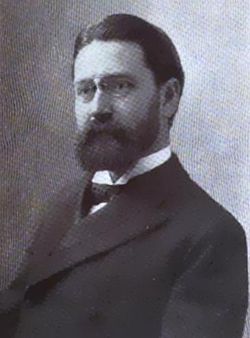Edwin Robert Anderson Seligman
| Edwin R. A. Seligman | |
|---|---|
 |
|
| Born |
April 25, 1861 New York City |
| Died | July 18, 1939 (aged 78) |
| Nationality | American |
| Institution | Columbia University |
| Alma mater | Columbia University |
| Doctoral advisor |
John Burgess |
| Doctoral students |
B. R. Ambedkar Paul Douglas Robert Murray Haig Alvin Saunders Johnson |
Edwin Robert Anderson Seligman (1861–1939), was an American economist who spent his entire academic career at Columbia University in New York City. Seligman is best remembered for his pioneering work involving taxation and public finance.
Edwin Seligman was born April 25, 1861 in New York City, the son of banker Joseph Seligman.
Seligman attended Columbia University, from which he graduated in 1879 with a A.B.. Seligman continued his studies in Europe, attending courses for three years at the universities of Berlin, Heidelberg, Geneva, and Paris. He earned his M.A. and LL.B. degrees in 1885 and successfully defended a Ph.D. in 1885. He later was awarded a LL.D. in 1904.
Seligman spent his entire academic career at Columbia University, first joining as a lecturer in 1885. He was made an adjunct professor of political economy in 1888. He became the first McVickar Professor of Political Economy at the same university in 1904, a position which he occupied until 1931.
Seligman's academic work dealt largely with matters of taxation and public finance, and he was regarded as a leading proponent of the progressive income tax. He also taught courses at Columbia in the field of economic history.
From 1886 Seligman was one of the editors of the Political Science Quarterly. He also edited Columbia's series in history, economics, and public law from 1890.
Seligman was a founder of the American Economic Association and served as president of that organization from 1902 to 1904. He was also a key figure behind the formation of the American Association of University Professors, serving as that group's president from 1919 to 1920.
...
Wikipedia
